Overview
This article highlights essential management strategies that startup founders can implement to enhance productivity and organizational effectiveness. It underscores various techniques such as:
- Automation through tools like Casy
- The Pomodoro Technique for time management
- Effective delegation
- Prioritization using the Eisenhower Matrix
- Fostering feedback loops
Research supports these strategies, demonstrating their positive impact on efficiency and team morale. By integrating these approaches, founders can not only streamline operations but also cultivate a more engaged and motivated team.
Introduction
In the fast-paced world of startups, effective management strategies can be the difference between success and failure. Founders face the daunting challenge of balancing innovation with operational efficiency, often leading to overwhelming workloads and missed opportunities. This article delves into ten essential management strategies that empower startup leaders to streamline their processes, enhance productivity, and foster a thriving work environment.
How can these strategies transform the way founders approach their daily challenges and drive their ventures toward sustainable growth?
Casy: Automate Task Management for Enhanced Productivity
Casy operates as an invisible project manager, seamlessly integrating with chat platforms like Slack and Telegram. By automatically capturing essential information from conversations, it converts discussions into actionable items, establishes deadlines, and updates documents without the need for manual input. This level of automation empowers new venture teams to focus on their core activities, significantly minimizing administrative overhead and enhancing overall productivity.
But how can Casy transform your management strategies for the project? Founders can leverage Casy's capabilities in their management strategies to maintain clarity and organization within their projects, ensuring that no critical tasks slip through the cracks. In fact, organizations that implement effective project management practices can see project success rates improve by 2.5 times. Furthermore, with 12% of resources squandered due to ineffective project management strategies, Casy assists new businesses in optimizing their workflows, reducing miscommunication, and concentrating on innovation, ultimately propelling their growth and success.
Notably, Casy requires minimal setup and manual input, making it ideal for fast-moving teams. Additionally, Casy is dedicated to data privacy, guaranteeing that user content remains secure and confidential—an essential aspect for new businesses concerned about data protection.
Are you ready to elevate your project management strategy? With Casy, you can streamline your processes and focus on what truly matters: driving your startup forward.
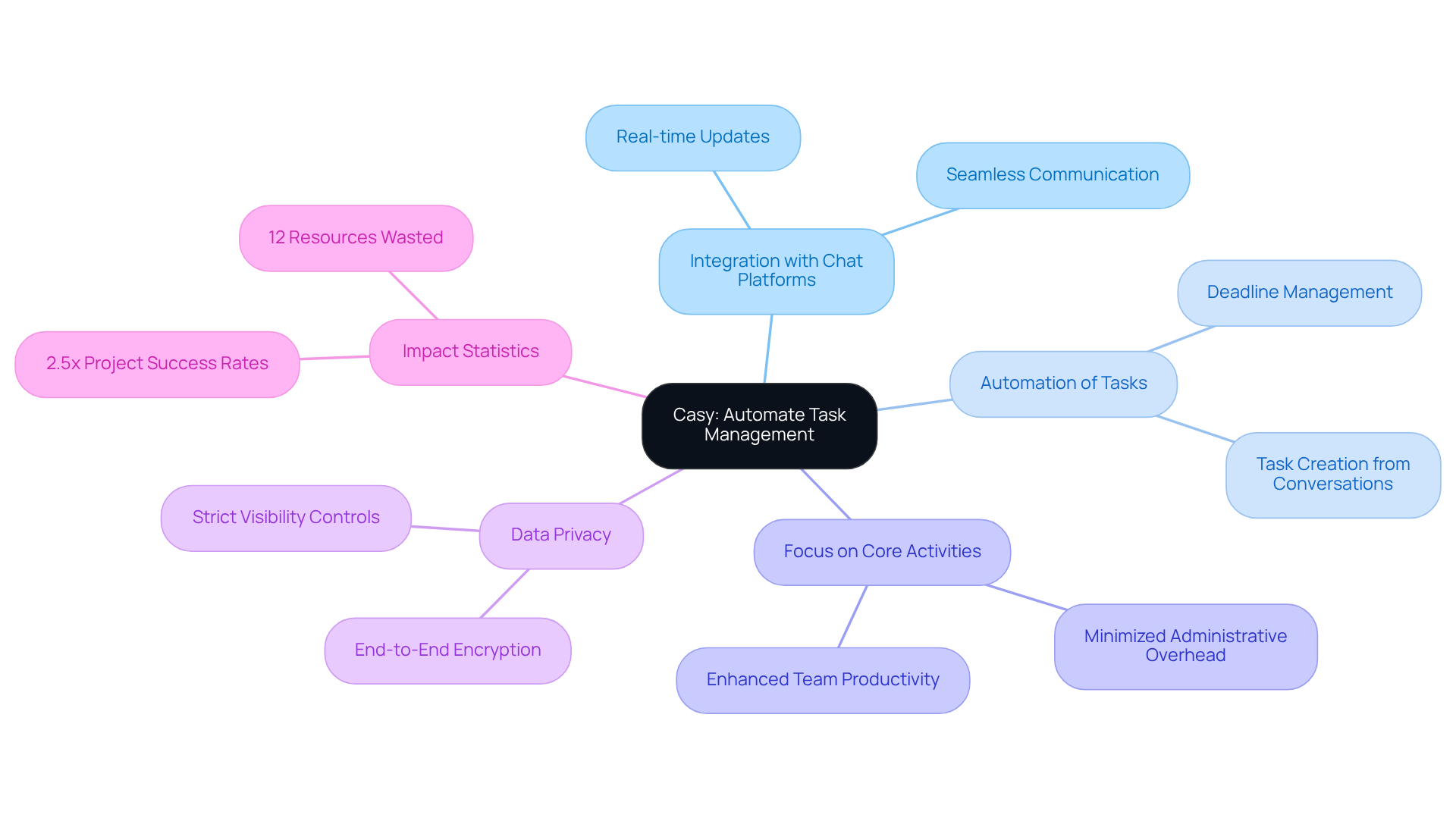
Pomodoro Technique: Boost Focus and Efficiency
The Pomodoro Technique stands as a powerful time management strategy, characterized by focused work sessions of 25 minutes, followed by a 5-minute break. This structured approach not only sustains high levels of concentration but also mitigates burnout by incorporating regular intervals for relaxation and recharging. By segmenting work into manageable periods, startup creators can significantly enhance their efficiency while remaining engaged with their responsibilities.
Consider this: research indicates that 90% of individuals believe that improved time management will elevate their productivity. Furthermore, employees can reclaim up to 40 hours each month by effectively managing interruptions. Applying the Pomodoro Technique fosters enhanced focus, empowering entrepreneurs to tackle their responsibilities with renewed vigor. Ultimately, adopting management strategies contributes to a more productive and balanced work environment, making it an invaluable tool for any startup founder.
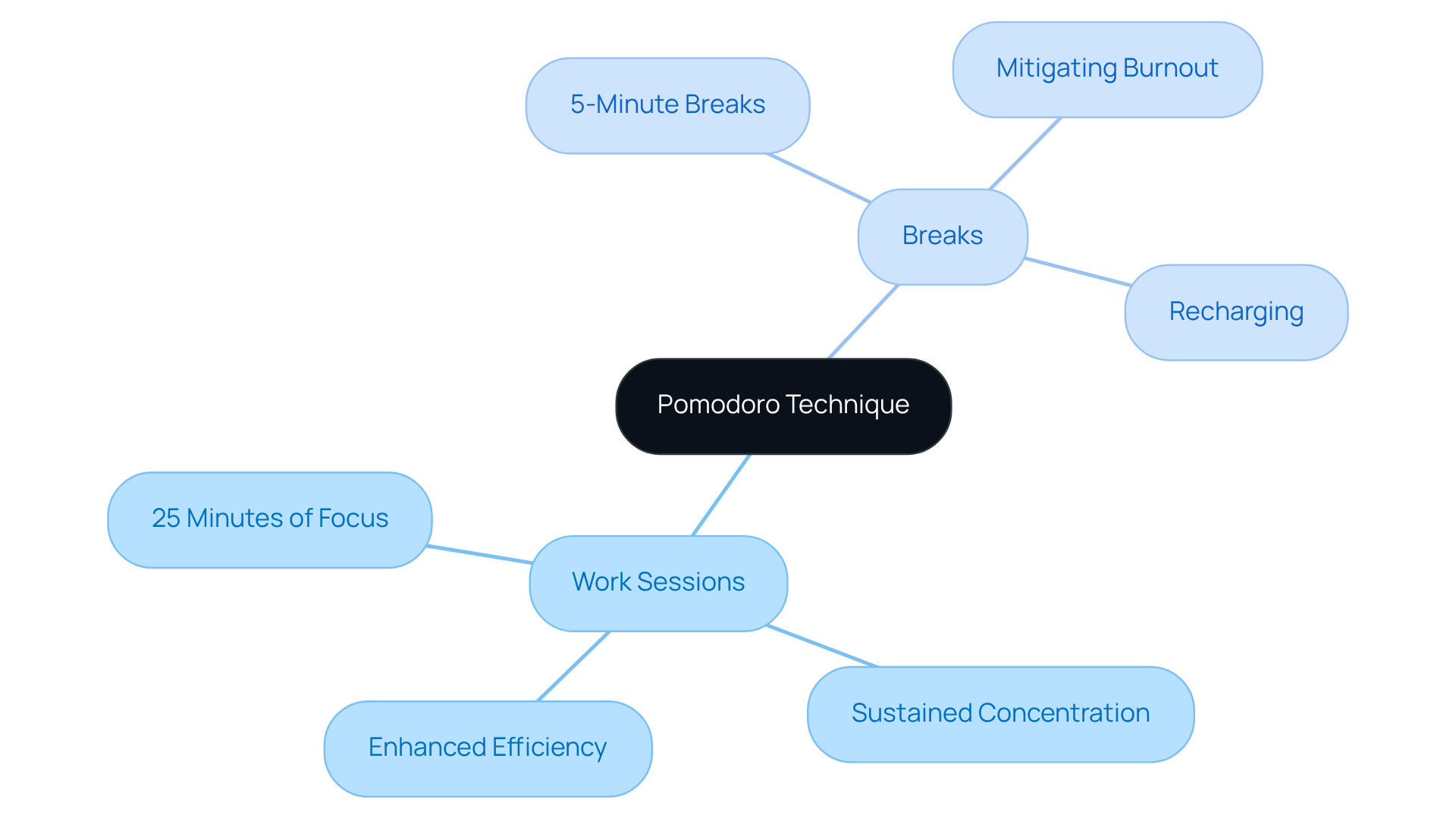
Time Blocking: Structure Your Day for Maximum Output
Time blocking stands as a powerful method that involves dividing your day into designated time slots for specific activities or categories of work. By allocating distinct periods for deep work, meetings, and breaks, founders can create a structured schedule that minimizes distractions and maximizes focus. This approach not only facilitates efficient time management but also ensures that crucial activities receive the attention they warrant.
Research reveals that task-switching can diminish productivity by as much as 40%, underscoring the necessity of time blocking as a strategy for sustaining concentration. As Philip Sywash aptly notes, founders must adopt management strategies that ensure their energy is concentrated on high-impact activities, all while handling constant interruptions and competing priorities.
Founders can explore various time blocks to uncover a rhythm that aligns with their workflow, ultimately enhancing productivity and fostering a healthier work-life balance. Indeed, studies show that organized scheduling can yield significant productivity gains, with teams utilizing Asana reporting a 45% reduction in time spent managing tasks. By prioritizing activities within these time blocks, startup founders can focus on high-impact endeavors, driving growth and innovation in their ventures.
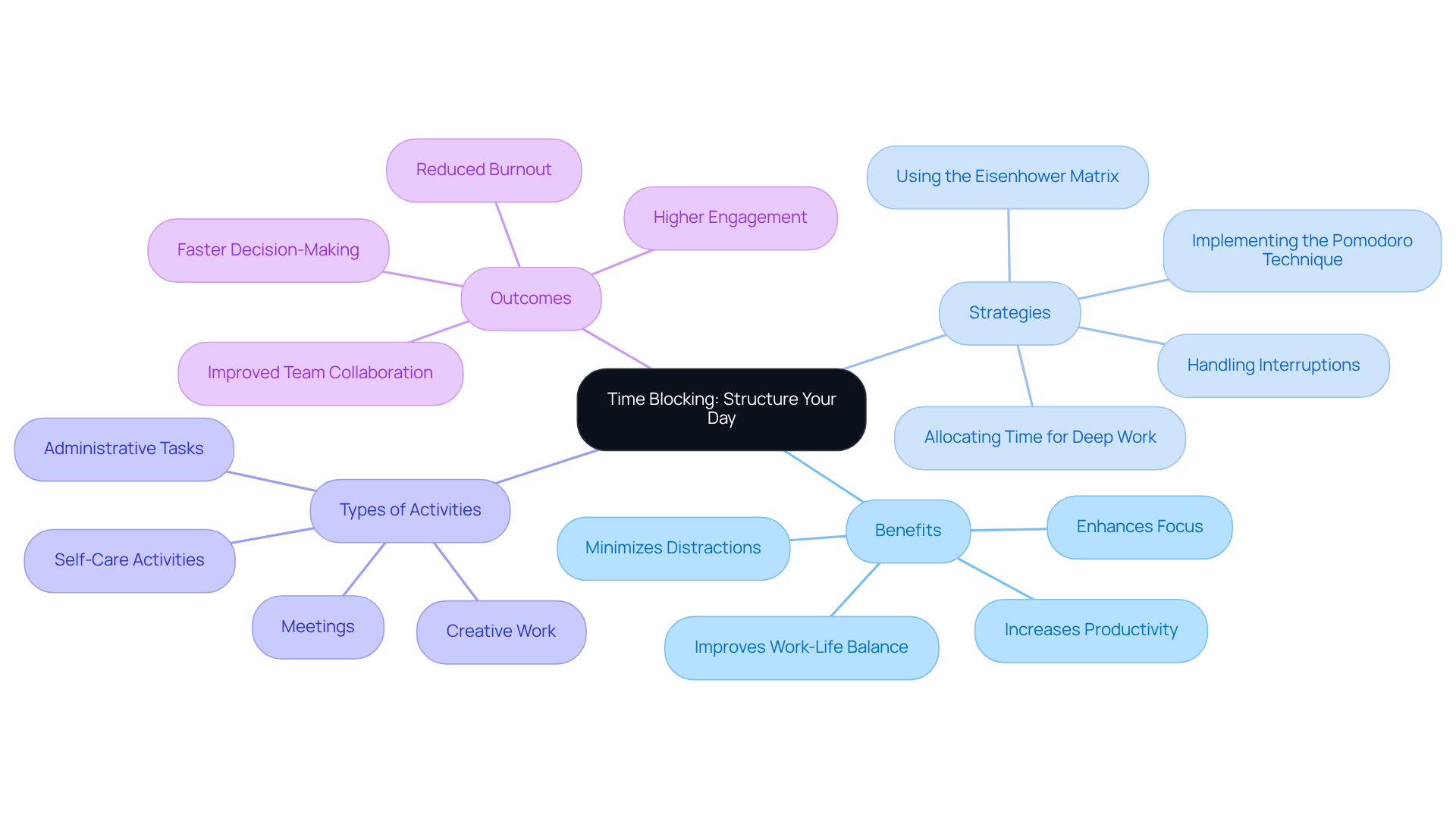
Delegation: Empower Your Team to Share Responsibilities
Delegation serves as a strategic method that involves assigning tasks to group members based on their strengths and expertise. By empowering your group to take ownership of specific responsibilities, you not only alleviate your own workload but also cultivate a culture of trust and collaboration. This practice is essential for startup founders, enabling them to concentrate on high-level strategic initiatives while ensuring that management strategies for daily operations are implemented efficiently.
To delegate effectively, it is crucial to establish clear expectations regarding deliverables, timelines, and available resources. Define success criteria and provide the necessary assistance and training for your group to excel in their assigned responsibilities. Research indicates that effective delegation can lead to substantial enhancements in group performance and morale, as it promotes initiative and accountability among members.
As leadership experts note, effective management strategies in delegation not only enhance operational efficiency but also foster a positive work environment where employees feel valued and engaged. Integrating a priority matrix can aid in deciding which responsibilities to delegate based on their impact and reversibility, allowing you to focus on high-stakes decisions while empowering your group.
Moreover, recognizing and rewarding employee performance is vital for maintaining morale and encouraging collaboration. Regular check-ins, without micromanaging, are essential for fostering accountability and ensuring tasks remain on track. By trusting your group and allowing them to take on responsibilities, you create opportunities for growth and innovation within your organization. As Allison Dunn emphasizes, trust is key to effective delegation, enabling leaders to focus on strategic initiatives while empowering their teams to thrive.
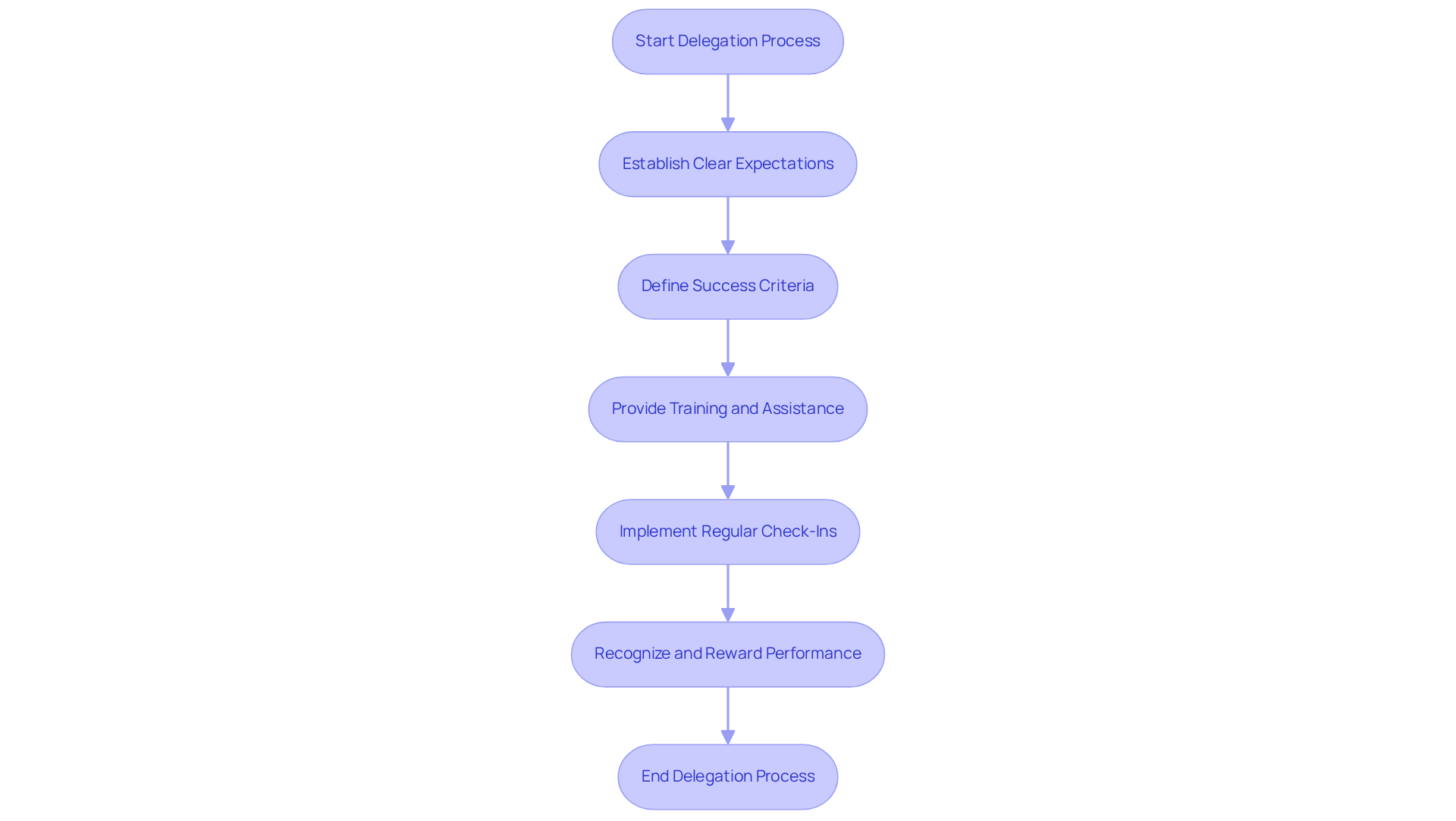
Prioritization: Identify and Focus on Key Tasks
Effective management strategies for startup leaders are essential, as they allow for the evaluation of responsibilities based on urgency and significance. The Eisenhower Matrix serves as a robust framework, classifying activities into four quadrants:
- Urgent and important
- Important but not urgent
- Urgent but not important
- Neither urgent nor important
This method empowers entrepreneurs to focus on what truly matters, ensuring that their management strategies align with strategic goals and foster growth.
Regularly reviewing and adjusting priorities using the Eisenhower Matrix can significantly enhance productivity. New ventures implementing this framework often report improved task management and a reduced risk of burnout, as it clarifies which tasks require immediate attention and which can be scheduled for later. According to Bojana Trajcheva, "34% of founders cite lack of product-market fit as the main reason for new ventures failing," underscoring the critical role of effective prioritization in preventing failure.
Case studies illustrate the effectiveness of the Eisenhower Matrix in new business environments. Founders who adopt this approach can systematically identify critical tasks, leading to better resource allocation and more efficient workflows. By prioritizing effectively, business leaders can utilize management strategies to navigate the complexities of their roles, ultimately fostering a more resilient and successful organization. As noted, entrepreneurs often juggle multiple roles including product development, marketing, sales, hiring, and finances, highlighting the necessity of effective management strategies like the Eisenhower Matrix.
Integrating the Eisenhower Matrix into daily routines not only simplifies operations but also enables entrepreneurs to maintain focus amidst the myriad responsibilities they manage. Prioritization is crucial for making strategic choices in startups, where limited resources require a clear understanding of activity value and urgency. Furthermore, utilizing automation within the Eisenhower Matrix framework can enhance efficiency, enabling entrepreneurs to allocate their time and resources more effectively.
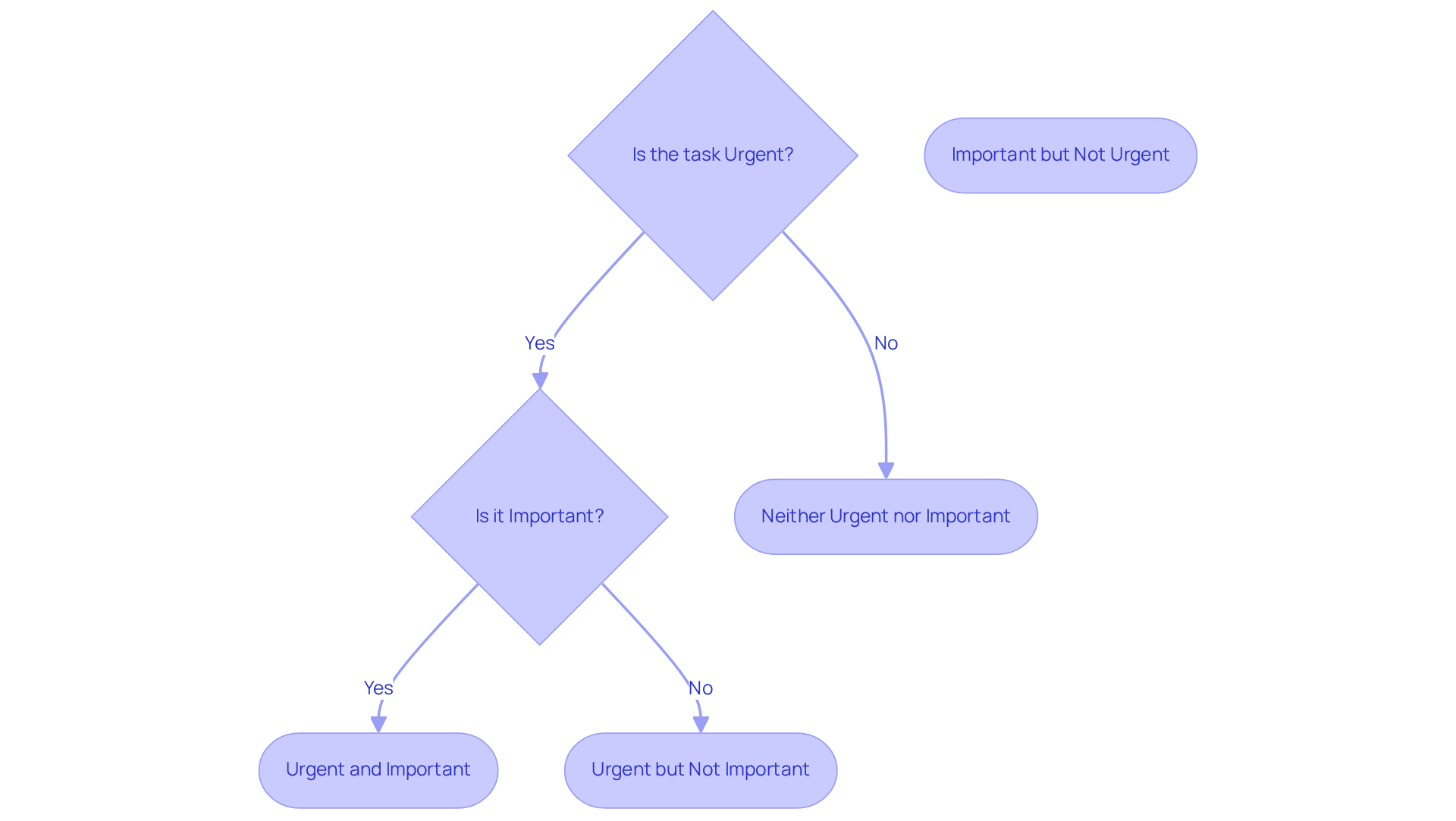
Planning Tools: Organize Tasks and Deadlines Effectively
Planning tools such as Casy, Asana, and Trello are essential for founders aiming to organize tasks and deadlines with efficiency. These platforms provide visual displays of project timelines, allowing teams to monitor progress and identify bottlenecks effectively. Have you considered how integrating these tools into your daily workflows could enhance collaboration? By doing so, startup leaders can streamline communication and ensure that all team members are aligned on project goals. Regularly updating these tools not only fosters accountability but also keeps the team focused on their objectives. Embrace these tools to transform your management strategies and drive your startup towards success.
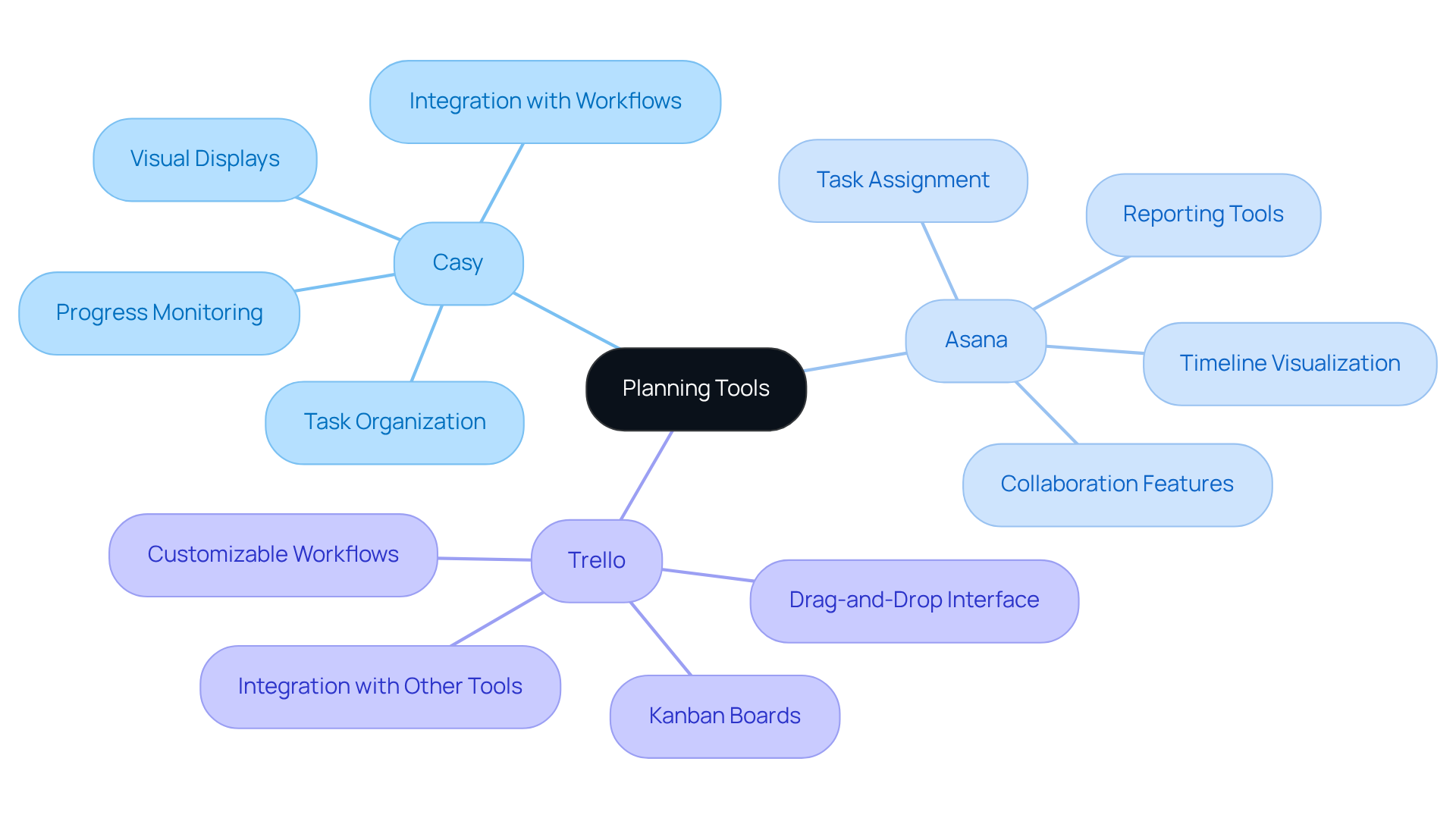
Avoid Multitasking: Focus on One Task at a Time
Research indicates that multitasking can reduce productivity by as much as 40%. Instead of juggling multiple activities at once, entrepreneurs should focus on one task at a time to enhance both efficiency and the quality of their results. By eliminating distractions and dedicating their attention to a single activity, business leaders can achieve improved outcomes in a shorter timeframe. This strategy not only boosts productivity but also alleviates stress, leading to a more fulfilling work experience.
- Cognitive Benefits: Studies demonstrate that employing single-tasking strategies, such as the Pomodoro Technique, can enhance concentration levels by 25%.
- Mental Health Impact: Multitasking often results in heightened stress and anxiety, adversely affecting overall well-being.
- Expert Insight: Avantika Bhardwaj warns that multitasking can cause permanent brain damage while diminishing efficiency and mental performance.
By embracing a focused approach and utilizing effective management strategies, entrepreneurs can significantly elevate their productivity and cultivate a healthier work environment.
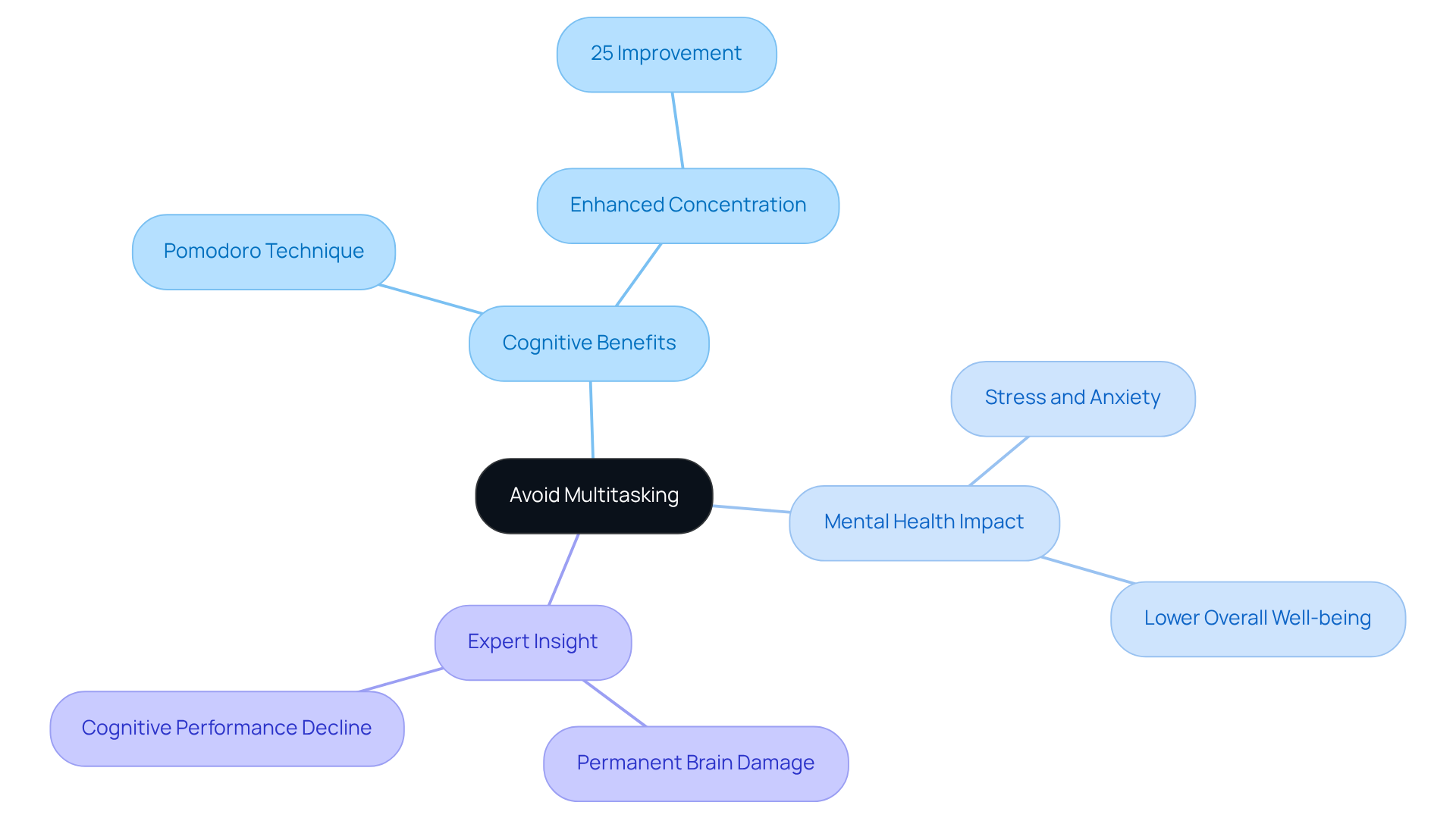
Health Management: Prioritize Well-Being for Sustained Performance
Startup leaders often encounter heightened stress levels and extended working hours, making health management an essential aspect of their success. Prioritizing well-being through regular exercise, balanced nutrition, and adequate rest can yield significant improvements in performance. Mindfulness practices and stress management techniques, such as meditation and deep-breathing exercises, enhance mental clarity and resilience. As Michael Freeman, M.D., emphasizes, mental health is vital for knowledge work, particularly for entrepreneurs facing unique challenges. By actively maintaining their health, entrepreneurs can sustain the energy and focus necessary to propel their businesses forward.
Research reveals that 62% of startup creators work between 50-60 hours weekly, highlighting the urgent need for effective management strategies to combat burnout and sustain productivity. How can entrepreneurs ensure their well-being remains a priority amidst the demands of their roles? As Karen Eyre-White suggests, planning in 12-week blocks can help entrepreneurs stay accountable and motivated. This structured approach ensures that personal health is not sidelined by business pressures.
Moreover, creating a supportive community, as noted by Arlan Hamilton, can provide valuable perspectives and motivation, further enhancing the well-being of entrepreneurs. Engaging with peers fosters a sense of belonging and shared experience, which is crucial in navigating the challenges of entrepreneurship. Are you prioritizing your health in your entrepreneurial journey?
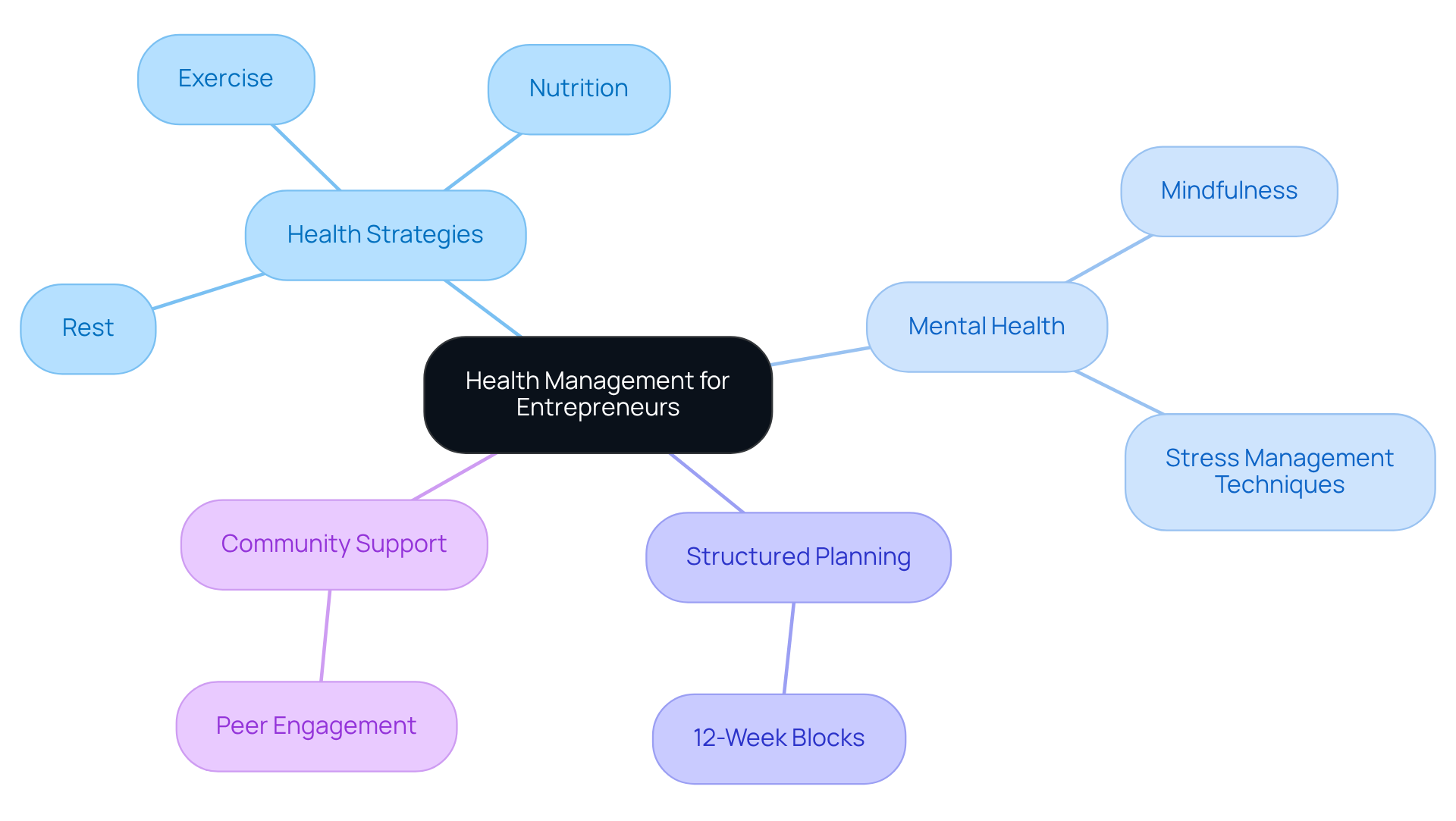
Feedback Loops: Enhance Processes Through Continuous Improvement
Creating feedback loops within your business is essential for the continuous assessment and improvement of management strategies. How can you ensure that your organization remains agile and responsive to challenges? By consistently collecting feedback from group members and stakeholders, founders can identify areas needing enhancement and implement appropriate management strategies to execute the required modifications. This practice not only boosts team morale but also fosters a culture of ongoing enhancement. For instance, companies that actively seek and analyze customer feedback can increase their revenue by up to 10%, while those with robust feedback systems experience a 14.9% boost in productivity.
Utilizing tools like surveys or regular check-ins can streamline effective feedback collection, fostering an environment where employees feel valued and engaged. Research shows that employees who receive regular feedback are 3.4 times more likely to be engaged at work, highlighting the significance of implementing management strategies that incorporate continuous improvement practices into your business operations. Furthermore, companies with structured feedback channels see a 25% increase in employee productivity, underscoring the effectiveness of these tools.
Establishing clear objectives for feedback loops is essential to ensure that the process aligns with desired outcomes. However, challenges remain in ensuring timely and accurate feedback collection. By addressing these challenges head-on, you can create a feedback culture that not only enhances performance but also drives your business forward.
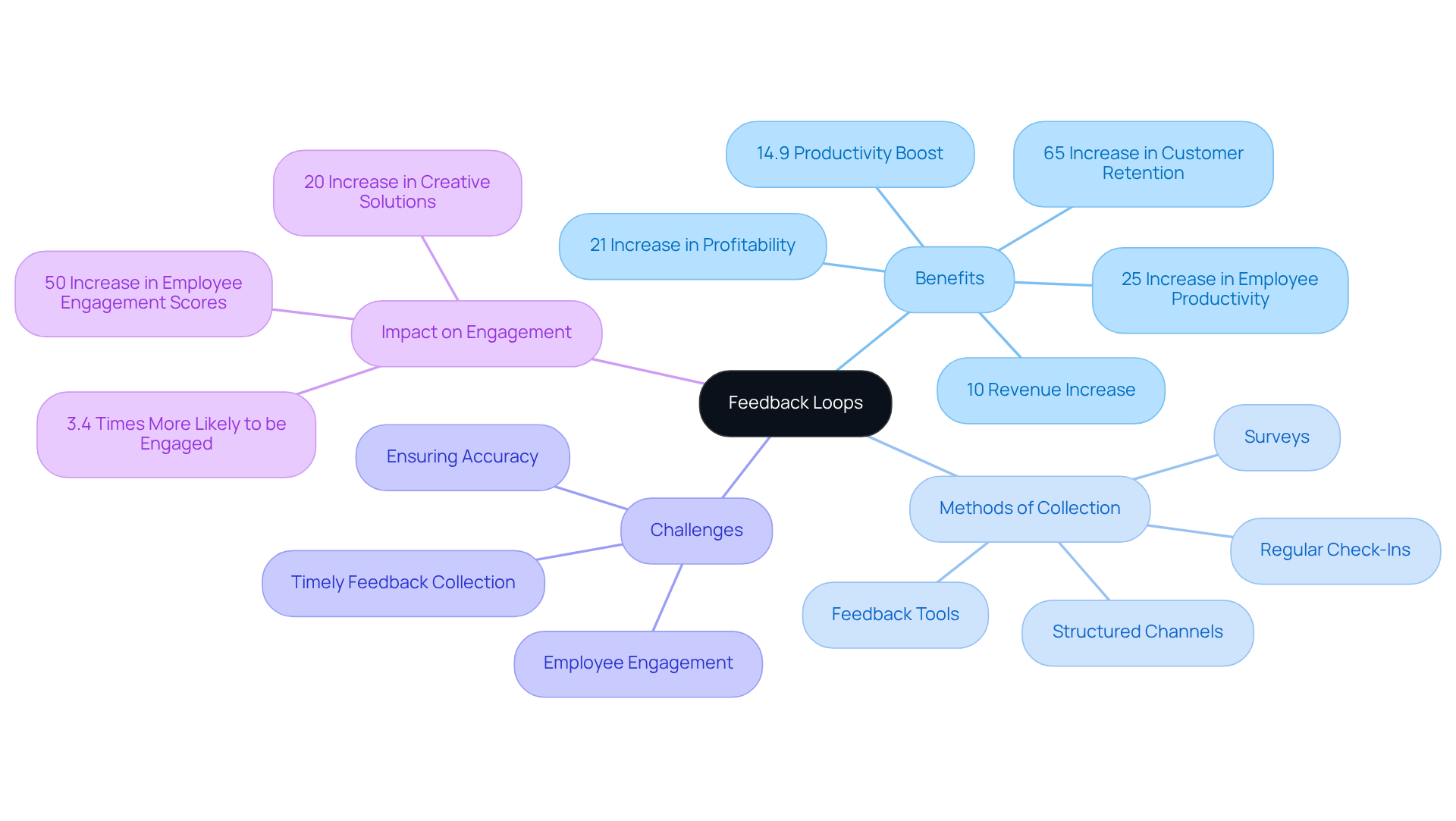
Change Management Strategy: Navigate Transitions with Confidence
In the dynamic realm of new ventures, change is an ever-present factor, making robust management strategies essential for success. Founders must prioritize the development of clear communication plans that articulate the reasons behind change and the anticipated outcomes. Engaging stakeholders early in the process fosters a sense of ownership and diminishes resistance. Studies indicate that organizations with strong employee involvement in change initiatives experience a 46% increase in intent to remain with the company. However, it is noteworthy that while 74% of leaders believe they involve employees in crafting a change strategy, only 42% of employees feel included, revealing a significant gap in engagement.
Training serves as another critical component, equipping teams with the skills required to adapt to new processes and technologies. By cultivating a culture of trust and openness, new ventures can navigate transitions with confidence, ensuring that members feel supported and aligned with organizational objectives. Regularly reviewing and adapting management strategies for change is vital, as 70% of change initiatives fail due to inadequate management and communication, with only 25% of organizations reporting that their senior leaders excel at managing change. This iterative approach enhances resilience and adaptability, empowering new ventures to thrive in an ever-evolving landscape.
Statistics reveal that 71% of employees felt overwhelmed by workplace changes during the COVID-19 pandemic, and 32% of change-fatigued employees reported diminished productivity. This underscores the necessity for effective communication during transitions. By prioritizing clear messaging and employee engagement, startups can alleviate change fatigue and enhance overall team performance, ultimately leading to greater success in achieving their objectives.
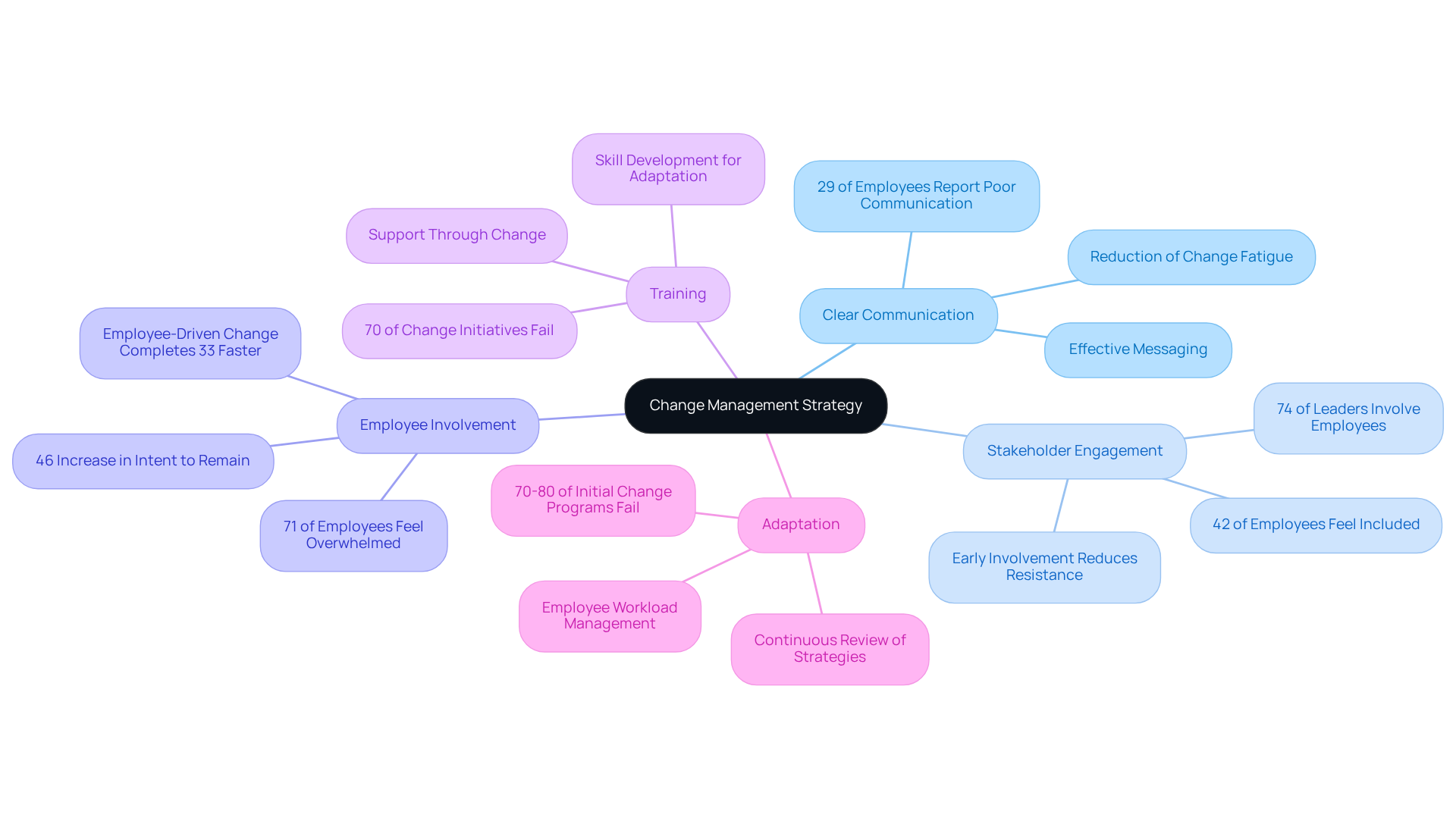
Conclusion
Implementing effective management strategies is crucial for startup founders striving for success in a competitive landscape. This article underscores the importance of various techniques, such as:
- Task automation with Casy
- The Pomodoro Technique for enhanced focus
- Time blocking to structure daily activities
Each strategy not only boosts productivity but also fosters a healthier work environment, enabling founders to concentrate on high-impact tasks while managing their resources efficiently.
Key insights include:
- The necessity of delegation to empower teams
- Prioritization through frameworks like the Eisenhower Matrix
- The use of planning tools to keep projects on track
Additionally, the significance of health management and feedback loops cannot be overlooked in maintaining a sustainable work culture. By adopting these strategies, startup leaders can navigate challenges effectively and drive their ventures toward growth and innovation.
In conclusion, the journey of entrepreneurship is filled with complexities. However, by embracing these essential management strategies, founders can enhance their productivity and create a thriving organizational culture. The call to action is clear: prioritize these techniques to not only achieve immediate goals but also to build a resilient foundation for long-term success in the ever-evolving startup ecosystem.
Frequently Asked Questions
What is Casy and how does it enhance productivity?
Casy is an automated task management tool that integrates with chat platforms like Slack and Telegram. It captures essential information from conversations, converts discussions into actionable items, establishes deadlines, and updates documents automatically, allowing teams to focus on their core activities and reducing administrative overhead.
How can founders use Casy in their management strategies?
Founders can leverage Casy to maintain clarity and organization within their projects, ensuring that critical tasks are not overlooked. Implementing effective project management practices with Casy can improve project success rates by 2.5 times and help optimize workflows, reduce miscommunication, and concentrate on innovation.
What are the benefits of using the Pomodoro Technique?
The Pomodoro Technique is a time management strategy that involves 25-minute focused work sessions followed by 5-minute breaks. This method enhances concentration, reduces burnout, and allows startup creators to manage their time effectively, leading to improved productivity and engagement with their responsibilities.
How does time blocking improve productivity?
Time blocking involves dividing the day into designated time slots for specific activities, which helps minimize distractions and maximize focus. This structured approach ensures that crucial tasks receive attention and can lead to significant productivity gains by reducing the time spent on task-switching.
What evidence supports the effectiveness of the Pomodoro Technique?
Research indicates that 90% of individuals believe improved time management enhances productivity, and employees can reclaim up to 40 hours each month by effectively managing interruptions, making the Pomodoro Technique a valuable tool for startup founders.
What impact can organized scheduling have on teams?
Organized scheduling, such as that achieved through time blocking, can lead to significant productivity improvements. For example, teams using Asana have reported a 45% reduction in time spent managing tasks, allowing them to focus on high-impact activities.




